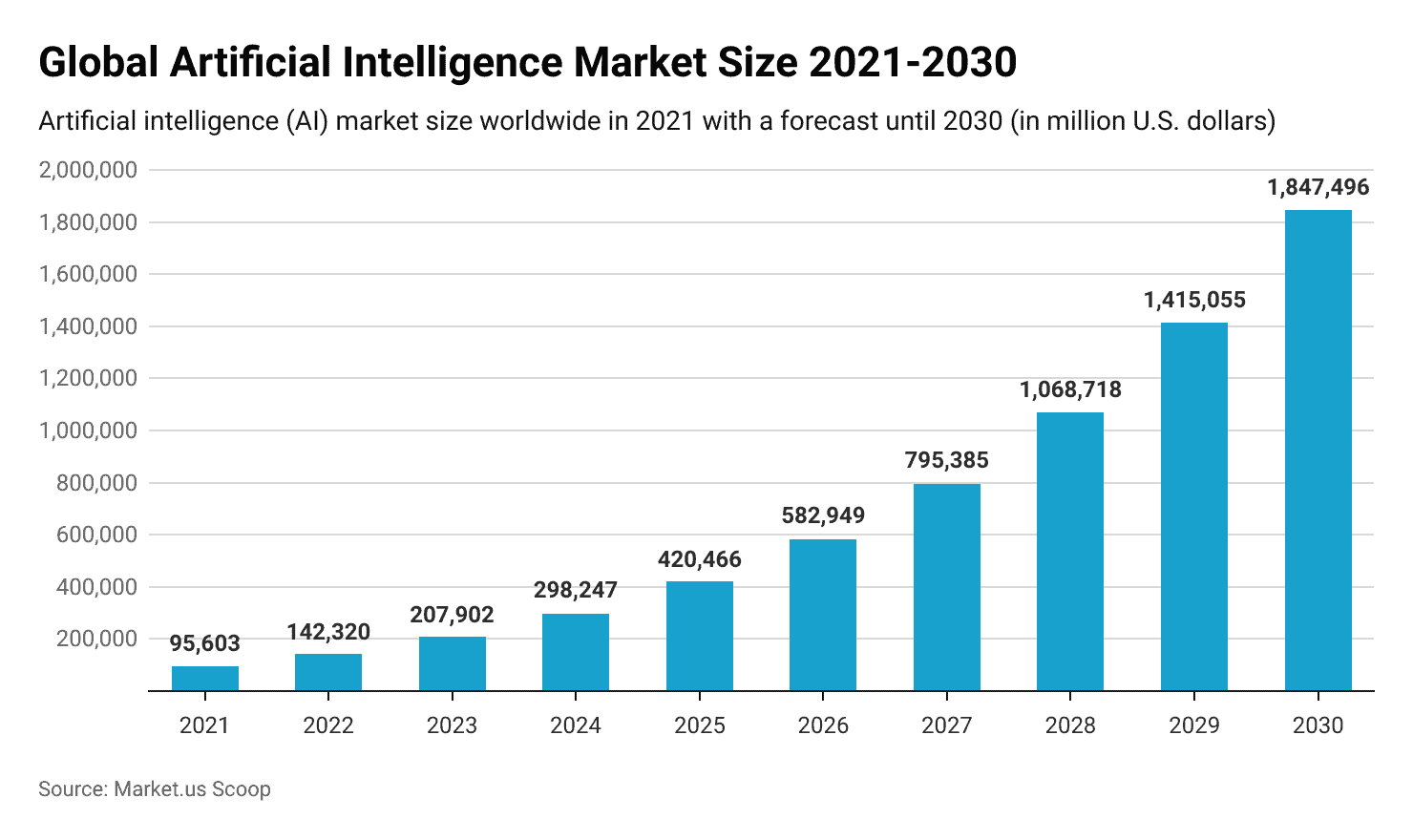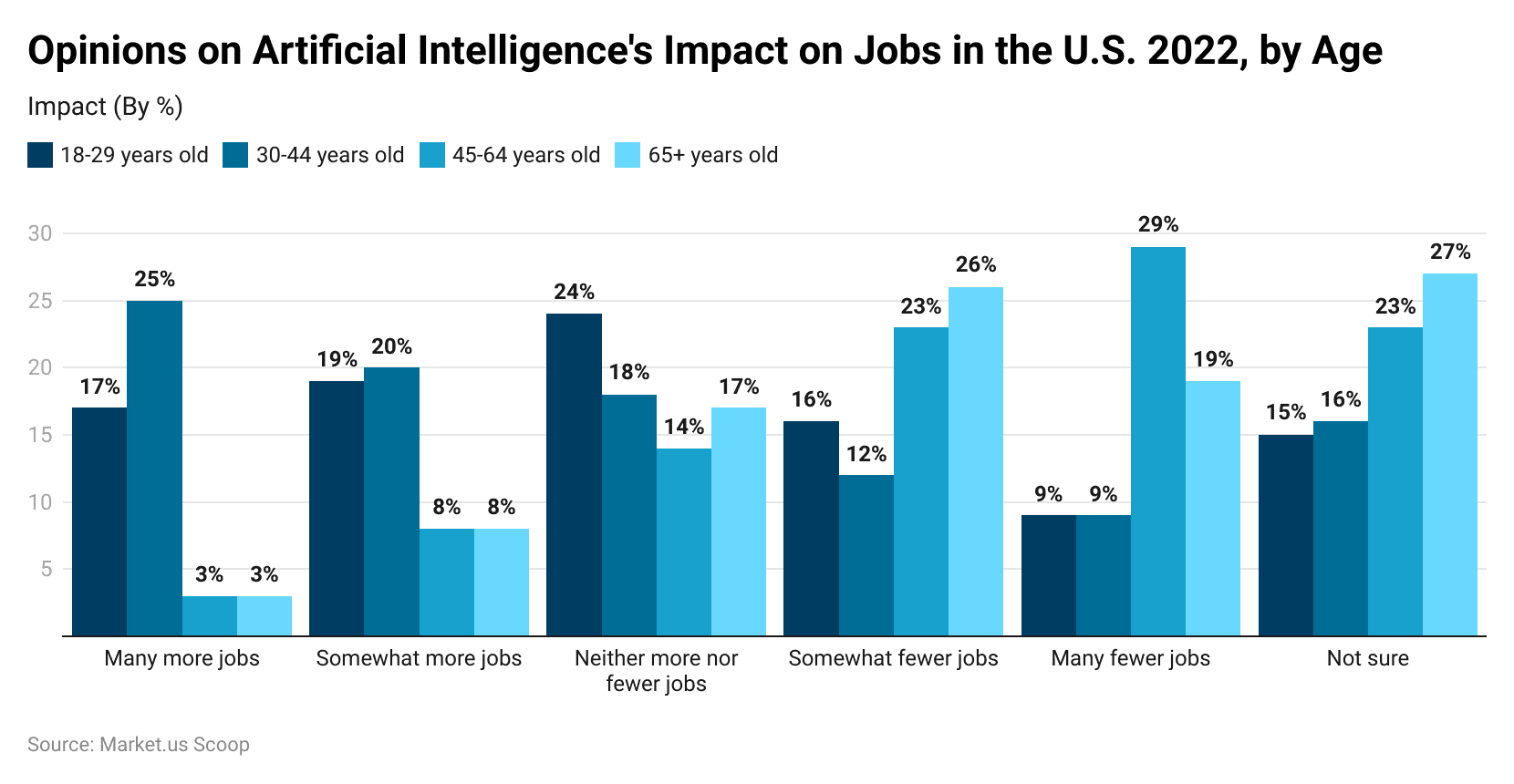Table of Contents
“According to Market.us, the Generative AI by artificial intelligence (AI) market will increase rapidly over the next decade. Its current worth of roughly 100 billion US dollars is predicted to more than double by 2030, reaching nearly USD 2 trillion. The AI market encompasses a wide range of industries.”
Statistics for Generative AI
- AI-powered search is interesting to 49% of US adults.
- In the United States, 31% of respondents are skeptical of AI-powered search results.
- Despite the current economic concerns, 63 percent of business leaders intend to boost or maintain AI spending.
- 61% of respondents (Global Audience) are skeptical about artificial intelligence (AI) technologies.
- Darktrace security researchers found a 135% spike in social engineering attack emails in the first two months of 2023.
- 82% of employees are concerned about hackers using generative AI to send phishing emails.
- Americans who are aware of AI-generated news articles such as those from ChatGPT saw it as a large advance, a medium advance, and no advance at all.
- VC firms invested $1.7 billion or more in generative AI across three years, with AI medicine discovery and software development garnering the greatest funding.
- By 2025, generative AI approaches will be used to develop more than 30% of newly found pharmaceuticals and materials, up from 0% now. ChatGPT and other early AI models attempt to improve creative work.
- Artificial intelligence will be responsible for 30% of large organizations’ outbound marketing messaging by 2025, up from less than 2% in 2022.
- A major blockbuster film is expected to be made in 2030, with AI accounting for 90% of the budget, up from 0% in 2022.
- In the United States, AI may replace 7% of occupations, while it will improve 63% of jobs while leaving 30% unaffected.
- From 2018 to 2022, the most often used categories in Generative AI were interfaces using natural language or 2D-media production, accounting for 29.3% and 18.8% of VC-backed deals, respectively, and 23.6% and 11.4% of total invested dollars.
- When it comes to AI content, 35% of marketers see concerns with ‘risk’ and ‘governance’ as a challenge.
- In the United States, 56% of adults believe AI-generated material is biased or deceptive.
- AI in the workplace can save both time and money, according to 62% of US adults.
- According to 47% of US adults, AI should replace unnecessary tasks at work in order to increase efficiency and production.
- 43% of adult workers in the United States feel AI-generated written content may be as excellent as human-authored content.
(Source: Goldman-sachs-predicts)
Generative AI Use Cases for Marketers
- ChatGPT, word, Jasper, Copy.ai, Frase, and Quillbot are among the AI technologies used by 58.9% of marketers to optimize current content.
- 57.1% of firms utilize artificial intelligence tools to create long-form content (blogs, white papers, and eBooks).
- 55.4% of marketers use artificial intelligence tools to create short-form content for social media and product descriptions.
- 48.2% of marketers use Generative AI tools to generate future content ideas.
- 46.4% of marketers use Generative AI to generate long-form content headlines, while 44.5% use it for keyword research.
- According to 88% of marketers, using Generative AI saves their firm time and money.
- According to 88% of marketers, AI content is as good as or better than human content.
Global Artificial Intelligence Market Size 2021-2030
According to Generative AI Statistics, The artificial intelligence industry has grown by using Generative AI significantly in recent years and is likely to increase further in the coming years. AI technologies are being embraced across a wide range of industries and applications, revolutionizing company operations and opening up new avenues for innovation.

Artificial Intelligence for Science, Medical Sciences, and Mental Wellness
- More than half of Americans consider the use of artificial intelligence in operations as a beneficial development. The Pew Research Center is an independent research institution.
- AI-assisted surgery is considered a big medical advancement by 56% of people who are aware of it, a moderate medical advancement by 22%, and a non-advance by 5%.
- Those who are familiar with artificial intelligence-based skin cancer diagnosis had a positive attitude, with 52% seeing it as a significant medical advancement and 27% seeing it as a modest one.
- When compared to other applications, fewer Americans (30%) believe that AI-assisted pain medicine decisions are major, while 37% believe they are insignificant.
- Among US adults who are aware of mental health chatbots, 19% consider it a major advancement, 36% consider it a small advancement, and 25% do not consider it an advancement.
(Source: World Economic Forum)
ChatGPT Statistics
- 53% of employees say their firm is now using or planning to use ChatGPT.
- 16% of users utilize ChatGPT, with 59% desiring to use it.
- 35% of clients are unaware of ChatGPT.
- It is useful to 86% of ChatGPT users, who use it for a variety of reasons.
- Telecommunications, insurance, software development, engineering, and management consulting are the top five industries that employ ChatGPT.
- 68% of users utilize ChatGPT to answer questions rather than search engines.
- AI improvements, according to 63% of ChatGPT users, would help improve the workplace.
- Half of ChatGPT users have worries about the influence of AI tools on the creative industry.
- 46% of ChatGPT users are concerned about AI bias.
- 50% of users would pay for ChatGPT’s premium edition.
(Source: GWI)
AI’s Impact on Businesses and Performance
- 78% of customer service employees are optimistic about artificial intelligence.
- According to McKinsey, AI implementation has resulted in cost savings for 79% of executives.
- Ai-enabled contact centers are more than twice as efficient as traditional contact centers.
- Using AI increases company performance, according to 66% of customer service personnel
- Using Codex, a code-generation tool, Deloitte developers discovered a 20% increase in code development speed (HBR).
Other AI generative stats
- The most popular search engine for ChatGPT is China, followed by Nepal and Singapore.
- OpenAI’s AI detection software’s classifier can correctly recognize 26% of AI-written text while misunderstanding human-written text as AI-written 9% of the time.
- The GPT-3 language model was created with the help of 175 billion parameters.

AI’s Future Potential
The future of AI is quite exciting, with enormous potential to revolutionize various facets of our lives. Here are a few important areas where AI is predicted to have a large future impact:
- Automation: Artificial intelligence will continue to automate repetitive operations across industries, resulting in enhanced efficiency and productivity. Manufacturing, shipping, customer service, and data analysis are all examples of this.
- Healthcare: AI has the potential to transform healthcare by assisting in early disease identification, tailored medicine, and medication discovery. It is capable of analyzing massive volumes of medical data, assisting in diagnosis, and even providing virtual medical aid.
- Autonomous Vehicles: The advancement of self-driving automobiles and other autonomous vehicles is accelerating. AI is critical to these vehicles’ ability to comprehend their environment, make judgments, and travel safely.
- Natural Language Processing: Natural language processing (NLP) systems driven by AI will continue to evolve, allowing for more advanced voice assistants, translation tools, and language understanding skills. This will improve human-computer interaction and help to overcome linguistic hurdles.
- Robotics: Artificial intelligence and robotics are combining to produce smart robots capable of completing complicated tasks. These robots can be used to aid humans in a variety of tasks in areas such as manufacturing, healthcare, agriculture, and even home settings.
- Cybersecurity: As cyber dangers evolve, AI will become increasingly important in detecting and mitigating these risks in real time. AI-powered cybersecurity solutions can detect patterns, anomalies, and probable breaches, hence improving digital system security.
- Ethical and Responsible AI: Addressing ethical problems and ensuring responsible research and deployment are equally important aspects of AI’s future. To manage AI systems, efforts will be made to minimize biases, preserve openness, safeguard privacy, and develop ethical rules.
- AI-assisted Creativity: Artificial intelligence (AI) techniques are rapidly being used to support and augment human creativity in industries such as art, music, and content creation. AI algorithms can create unique artwork, produce music, and even assist in the creation of articles or books.


